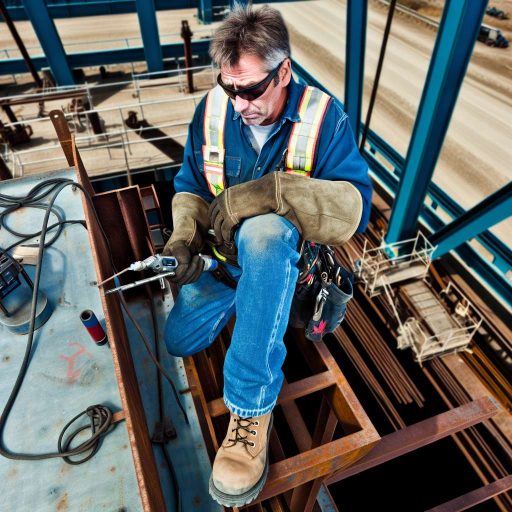Overview of Residential Roofing Jobs
Roles and Responsibilities
Residential roofing jobs require skilled professionals committed to quality work.
These individuals focus on installing and repairing roofs for homes.
Contractors like Mason Roofing prioritize customer satisfaction and safety.
Workers often collaborate with homeowners to assess project needs.
They provide estimates and recommend suitable materials for roofs.
Key Responsibilities
Each roofing professional has specific responsibilities.
First, they inspect roofs to identify damage or wear.
Next, they plan their work for maximum efficiency and safety.
They also ensure compliance with local building codes and regulations.
Moreover, workers must oversee the quality of materials used.
Communication is vital throughout the entire roofing process.
Safety and Training
Safety is paramount in residential roofing jobs.
Workers undergo training programs to manage potential hazards.
They learn to use protective equipment to minimize risks.
Companies like Green Top Roofing provide ongoing safety training.
Regular drills ensure teams are prepared for emergencies.
Collaboration with Other Trades
Roofers often collaborate with other construction professionals.
Electricians may install roof-mounted solar panels alongside roofers.
Plumbers might work on systems that penetrate the roof.
This teamwork helps ensure a seamless renovation or construction process.
Project Management
Effective project management is essential in roofing jobs.
Roofing teams manage schedules to ensure timely completion.
They track materials and labor costs throughout the project.
Additionally, they adapt to unexpected weather changes.
Flexibility and proactive problem-solving enhance overall project success.
Unlock Your Career Potential
Visualize a clear path to success with our tailored Career Consulting service. Personalized insights in just 1-3 days.
Get StartedCommon Challenges Faced by Roofing Professionals
Safety Hazards
Roofing professionals often encounter significant safety hazards while on the job.
Working at heights increases the risk of falls, a leading cause of injuries.
Slippery surfaces further contribute to fall hazards during inclement weather.
Additionally, exposure to extreme temperatures can lead to heat-related illnesses.
Proper safety gear, such as harnesses and helmets, is essential to mitigate these risks.
Training on equipment usage and safety procedures can enhance workplace safety.
Environmental Challenges
Roofing jobs can present various environmental challenges during installations.
Debris from old roofs may affect cleanliness and safety around work areas.
Moreover, working in adverse weather conditions complicates project timelines.
Wind can blow materials off roofs, creating hazards for nearby workers.
Contractors must monitor weather forecasts to plan roofing jobs effectively.
Physical Demands
The physical demands of roofing work are considerable and require stamina.
Roofing professionals frequently lift heavy materials, which can lead to injury.
Climbing ladders and navigating rooftops increases the risk of strains and sprains.
Additionally, prolonged exposure to sun can lead to dehydration or exhaustion.
Regular breaks and access to hydration can help maintain worker health.
Regulatory Compliance
Roofing professionals must navigate varying local regulations and codes.
Understanding building codes ensures safety and compliance in every project.
Permitting processes can delay job timelines and complicate project planning.
Failure to comply with regulations can result in costly fines and rework.
Staying informed about local laws is crucial for successful roofing operations.
Customer Expectations
Managing customer expectations can be a challenging aspect of roofing jobs.
Homeowners may have unrealistic timelines and budget constraints.
Clear communication about project scopes can mitigate misunderstandings.
Moreover, discussing potential delays due to weather or material availability is vital.
Providing exemplary customer service can improve overall client satisfaction.
Physical Demands of Roofing Work
Endurance Requirements
Roofing work places significant demands on physical endurance.
Workers often spend long hours on their feet.
Additionally, they may have to perform repetitive movements.
Such tasks can lead to fatigue over time.
Moreover, maintaining energy levels is crucial for safety.
Taking regular breaks can help manage fatigue.
Strength Requirements
Strength plays a vital role in roofing jobs.
Workers need the ability to lift heavy materials.
Common materials include shingles, tiles, and insulation.
These materials can weigh up to several pounds each.
Moreover, climbing ladders and scaffolding requires upper body strength.
Strong core muscles are equally important for stability.
Balance and Coordination
Roofing tasks also demand excellent balance and coordination.
Workers often navigate steep and slippery surfaces.
They must avoid falls and other accidents while working.
Using safety equipment can improve stability on roofs.
Training in proper techniques enhances overall safety.
Overall Health Considerations
Physical health is paramount for successful roofing work.
Regular exercise can prepare workers for these challenges.
Nutrition also plays a key role in maintaining energy levels.
Additionally, hydration is crucial, especially in hot weather.
Staying fit helps workers meet the physical demands of their jobs.
Learn More: How Upholsterers Collaborate with Designers and Architects
Weather Impacts on Roofing Jobs
Dealing with Rain
Rain poses significant challenges for roofing jobs.
It can create safety hazards on site.
Workers may slip on wet surfaces.
Additionally, rain can delay project timelines.
Roofing materials may not adhere properly when wet.
It’s essential to have a weather plan in place.
Using tarps and coverings can protect materials.
Schedule work during dry periods whenever possible.
Communication with clients is crucial during rain events.
Navigating Snow
Snow can halt roofing work entirely.
Heavy snow loads may be unsafe for crews.
Clearing snow from roofs is necessary for safety.
Working in winter conditions requires special precautions.
Installers should use proper footwear to prevent slips.
They need to be aware of changing weather forecasts.
Every effort should prioritize the safety of workers.
Homeowners should be informed about potential delays.
Handling Extreme Heat
Extreme heat poses its own risks for roofing jobs.
Workers may suffer from heat exhaustion.
Staying hydrated is essential during hot days.
Scheduling heavier tasks for cooler times improves safety.
Workers should wear breathable clothing to stay cool.
Taking regular breaks in shaded areas is vital.
Proper equipment can help mitigate heat exposure.
Understanding heat safety protocols protects everyone on site.
Plan for Seasonal Challenges
Planning ahead helps manage weather-related issues.
Contractors should assess weather patterns in their area.
Broad awareness keeps projects on track regardless of conditions.
Having a flexible schedule allows for timely adaptations.
Investing in weather-resistant materials can mitigate risks.
Ultimately, proactive measures lead to successful roofing jobs.
Uncover the Details: Upholsterers and the Growing Demand for Custom Work
Skill Requirements for Roofing: Training and Certification Processes
Essential Skills for Roofers
Roofing requires a mix of technical and physical skills.
Workers must know how to use various tools effectively.
They should also understand different roofing materials and their applications.
Safety awareness is critical in this line of work.
Additionally, problem-solving skills help in addressing unexpected issues.
Strong communication skills facilitate better teamwork on job sites.
Formal Training Programs
Many roofers benefit from formal training programs.
These programs often include classroom instruction and hands-on experience.
Apprenticeships provide valuable on-the-job training.
They typically last several years, allowing trainees to learn from experienced professionals.
Some community colleges and trade schools offer specific courses in roofing.
Certification Opportunities
Certification can enhance a roofer’s career prospects.
Several organizations offer roofing certifications.
These may cover skills in installation, repair, and safety practices.
Obtaining a certification demonstrates a commitment to professionalism.
Certification can also lead to potential salary increases and job opportunities.
Staying Updated with Industry Standards
The roofing industry continually evolves with new technologies and materials.
Roofers should stay updated on the latest best practices.
Regular training sessions can help them remain competitive.
Many employers provide ongoing education and resources for their staff.
Being knowledgeable about new regulations is also essential for compliance.
Gain More Insights: Key Business Tips for Aspiring Upholstery Professionals
Financial Rewards of Roofing Jobs
Salary Overview
The salary for residential roofing jobs varies significantly.
On average, roofing professionals earn between $35,000 to $60,000 annually.
Factors such as experience, location, and company size influence earnings.
Experienced roofers often command higher salaries.
Moreover, specialized skills can increase income potential.
Benefits of Roofing Jobs
In addition to salary, roofing jobs offer various benefits.
Health insurance is commonly provided by employers.
This insurance often covers medical, dental, and vision care.
Retirement plans such as 401(k)s are also available.
Some companies offer training programs for career advancement.
Job Stability and Opportunities
The roofing industry is known for its stability.
Many homeowners require roofing services regularly.
This demand ensures consistent job opportunities for roofers.
Additionally, the construction industry continues to grow.
This growth contributes to the ongoing need for roofing professionals.
Potential for Overtime Pay
Roofing jobs often allow for overtime work.
Many projects require extended hours, especially during peak seasons.
This overtime can significantly boost overall earnings.
Working weekends or holidays typically yields higher pay rates.
Thus, roofers can improve their financial situation with overtime.
You Might Also Like: Key Certifications Required for Ironworkers in Canada

Career Advancement Opportunities in the Roofing Industry
Entry-Level Positions
The roofing industry offers various entry-level positions.
These roles often require minimal experience and training.
Work as a laborer or apprentice is a common starting point.
Additionally, on-the-job training helps develop essential skills.
As you gain experience, you can take on more responsibilities.
Skill Development and Training
Continuous training enhances your expertise in roofing.
Many companies provide workshops and safety courses.
Certifications can further increase your marketability.
For instance, becoming certified in material installation can be beneficial.
A commitment to learning opens doors to specialization.
Advancement to Supervisor Roles
With experience comes the opportunity for advancement.
Many laborers become foremen, supervising project teams.
This role involves overseeing daily operations and ensuring quality.
Effective communication skills are crucial for success in this position.
Further advancement may lead to project management opportunities.
Specialization in Roofing Types
Specializing in specific roofing types can enhance career prospects.
Areas of specialization include residential, commercial, and industrial roofing.
Becoming an expert increases your value in the job market.
Moreover, specialized knowledge often leads to higher pay rates.
Opportunities for Business Ownership
Eventually, you might consider starting your own roofing company.
Owning a business allows for creative freedom and financial independence.
Success in business relies heavily on networking and reputation.
Building a strong client base is essential for longevity.
Furthermore, understanding industry regulations and standards is crucial.
Networking and Community Involvement
Networking within the industry can provide numerous benefits.
Join local roofing associations to connect with peers.
Participating in community events can also boost visibility.
Moreover, strong relationships often lead to job referrals.
Collaboration with other contractors can create new opportunities.
Job Satisfaction Factors in Roofing Work
Sense of Achievement
Roofing jobs offer a strong sense of achievement for workers.
Each completed project showcases a tangible result of hard work.
This accomplishment boosts morale and encourages continued effort.
Many roofers take pride in their craftsmanship and skills.
Seeing a roof transform enhances their sense of purpose.
As a result, workers often feel fulfilled in their role.
Community Connection
Roofers often form close bonds within their team.
Working together fosters a strong sense of community.
Teamwork is crucial on the job site for safety and efficiency.
Shared challenges further strengthen these connections.
Additionally, roofers frequently engage with local homeowners.
This interaction fosters a sense of belonging in the community.
Many take pride in contributing to neighborhood improvement.
Building lasting relationships enhances job satisfaction significantly.
The Effect of Roofing Trends on Job Complexity: Green Roofs and Advanced Materials
Emergence of Green Roofing
Green roofs have become increasingly popular in recent years.
They provide insulation, reduce urban heat, and support biodiversity.
However, they also introduce complexity to roofing jobs.
Installing a green roof requires specialized knowledge and skills.
Contractors must understand plant selection and soil management.
Therefore, training and certification are essential for success.
Advanced Materials in Roofing
Modern roofing materials have evolved significantly.
Homeowners now seek durable, energy-efficient options.
Materials such as metal, rubber, and synthetic composites are prevalent.
These materials can improve energy efficiency and longevity.
Yet, they often necessitate new installation techniques.
Challenges in Installation
Complex roofing designs can be challenging for contractors.
These projects often require innovative problem-solving strategies.
Furthermore, the need for specialized tools increases project costs.
Safety protocols also become more stringent with advanced materials.
Contractors must ensure their team is trained in safety standards.
Balancing Complexity and Reward
Despite the challenges, green roofs and advanced materials offer rewards.
These projects can yield higher profits due to their complexity.
Homeowners appreciate the long-term benefits and energy savings.
As a result, contractors can build a reputation for quality work.
Ultimately, embracing these trends can lead to business growth.




